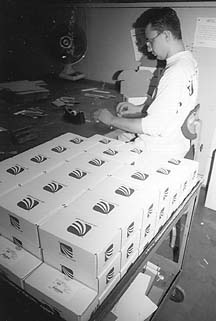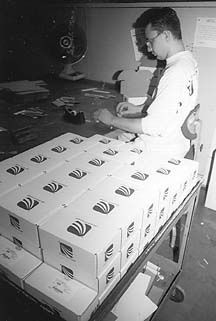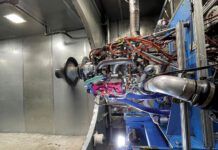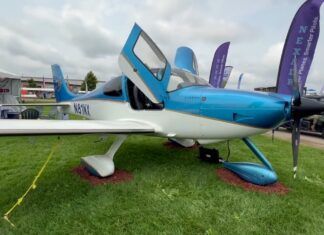
When light aircraft production took its final serious nosedive in the mid-1980s, the die was cast for engine overhaul shops and for Lycoming and Continental. Until then, the two engine makers had been happy building motors for new airplanes.
The Great Downturn changed the rules. With only a trickle of new airframes coming into the market, Lycoming and Continental sought new business from the only source available: Overhaul work.
This has proven a mixed blessing for aircraft owners. It has brought unprecedented competition to the overhaul market, putting downward pressure on prices, especially for new cylinders.
On the other hand, factory competition has driven many field shops out of business, limiting owner overhaul choices and, in some cases, making after-the-sale customer service iffy at best.
A major player in this game is Superior Air Parts, Inc., the Dallas-based parts house that supplies many overhaul and maintenance shops with the major parts and pieces for overhauls.
Many field shops credit Superior for creating enough competition to keep Lycoming and Continental from adopting market-will-bear pricing for overhaul parts, especially cylinders. (Indeed, in areas where Superior doesnt offer a PMA equivalent, TCM and Lyc prices often are surprisingly high.)
It seemed only a matter of time before Superior got into the engine business itself and now it has, with what the company calls its Certified Millennium Pre-Owned Engine. These are essentially remanufactured engines built to Superior specs by independent overhaul shops, using parts supplied by Superior.
On its face, this program appears to be an entirely new way of marketing and producing overhauled engines. But not really. It just shuffles the players a little.
While Superiors new Millennium program may give customers some additional choices and perhaps a better warranty, its thus far neither as radically new as it sounds nor fully developed in the market, despite an impressive promo campaign.
The Program
Superiors engine program consists of the Millennium engine and a five-year Security Assurance Program, a controlled warranty set-up that sounds like a five-year warranty but with a catch or two.
For the moment, this program applies to Continental six-cylinder engines but will presumably be expanded to other models later. The engine itself is for all intents and purposes a factory re-man built to Superiors specifications by engine independent overhaul facilities enrolled in this program and certified by Superior.
According to material provided by Superior and interviews with programs manager, Robert Williams, the engine will be overhauled using Superiors 67 point certification checklist and will feature Millennium cylinders, adherence to factory new tolerances where possible and improvements over factory dynamic balance specs.
The actual disassembly, inspection, reassembly and testing will be performed by overhaul facilities certified to meet Superiors requirements.
These requirements include being an FAA-certified repair station, employing in-house A&Ps, having engine test facilities and using only Superior authorized replacement parts, including cylinders.
Superior intends to back all of this with a service plan that includes a five-year or TBO warranty with coverage for both parts and labor and a network of customer service facilities centered around Superiors own toll-free 24-hour-a day technical service center.
If all this sounds like a quantum leap in quality-at least in warranty-over whats now available on the market, it appears to be just that. But you have to dig a little deeper here. In evaluating whether to purchase a factory reman, field overhaul or a Millennium engine, its important to separate fact from fiction and hype from true benefits to the buyer.
Superior is initially focusing on the six-cylinder Continental engines so we used an IO-520-BB spec 53 for a price comparison. The factory reman is currently priced at $19,940 while the Millennium comes in at $20,513. The core deposit for both is $8000. Thats only a $573 price premium for the Superior engine.
Bernie Coleman, Superiors president, argues that the engine is worth the modest premium for these reasons:
A five-year or TBO full parts and labor warranty.
The companys service program that includes toll-free 24-hour technical support.
Millennium engine service centers will be located at FBOs across the country.
Next day parts delivery through 40 distributors worldwide.
A Superior-backed financing program covering both purchase and installation.
A 67-point engine inspection checklist.
Superiors two-step controlled balancing program.
New Millennium cylinders.
Customer options such as fine-wire spark plugs and custom appearance packages at additional cost.
Fine Print
Whats not so obvious is that aside from the five-year parts and labor warranty, Superior wont be providing services that most field overhaul shops don’t provide, in some measure.
Any quality engine shop can provide an overhauled engine built to factory new specs with Millennium cylinders, dynamically balanced to strict tolerances, and certified in accordance with a stringent assembly checklist. And some can do it at or below the prices quoted by Superior or the factory.
Name shops such as Mattituck, Penn Yan Aero, Lycon, Custom or Certified may have shorter stated warranties than the five-years Superior is offering, but customers know in practice that such shops often informally extend warranty coverage beyond the stated limits.
So is this a good thing or not? At this point, we’ll have to reserve judgment. Since Superior wont build the engines itself but will rely on field shops to do the work, it remains to be seen if the company can exercise its quality control claims by remote control or at least enroll enough quality shops in the program to make it work. At the moment, not enough field shops have signed up to judge how we’ll this program will fly.
Parts, Competition
Know this about the field overhaul business, however: Its competitive and profit margins thin. It may or may not have a bright future. So why would Superior want to step into the market at this point, when many shops are struggling against the Big Two in a flat market?
It helps to see the aircraft engine overhaul market for what it is: Two distinct segments, engine parts sales and engine overhaul sales.
For now, Superior is limited to parts sales and is in direct competition with the OEMs for the independent overhaulers parts purchases. The OEMs would like to sell more parts to the independent overhaul shops and at the same time compete with them for your next overhaul.
By developing a broad line of FAA/PMA replacement parts, Superior has established itself as king of the hill in the engine replacement parts market and a ready alternative to factory parts.
These days, anyone who is in a position to use Superiors parts in an overhaul is probably already doing that, since using solely OEM parts would make the overhaul cost uncompetitive.But because the overhaul market isn’t robust-despite the fact that GA appears to be recovering-Superior has the same problem the OEMs faced in the 1980s: Limited market.
Short of Lycoming and TCM deciding to use Superior parts in their overhauls, the prospects of Superior increasing their PMA parts market share seem slim. In effect, Superiors potential for growth is directly proportional to the number of engine overhauls Superior or their customers (independent overhaulers) can take from TCM and Lycoming. The bad news, according to Superior, is that both OEMs are already doing a fine job of stealing overhauls from the independents through the use of advertising campaigns aimed at squeezing the best overhaulers-and subsequently Superior-out of business. Cutthroat parts pricing has helped.
The OEMs, of course, have a different view. TCMs Craig Bennington told us that TCM has necessarily raised the price of its remanufactured engines over the years and that if anything, the company has given the field overhaul industry ample room to compete.
Thus, if Superior wants to preserve-let alone expand-its parts market, it wont be able to rely entirely on independent overhaulers to compete and will have to have its own broad-based means of selling quality overhauls. And the Superior Engine is that means.
Wheres the Quality?
There are any number of reasons that an aircraft owner chooses to purchase a factory re-manufactured engine over a field overhaul.
But the common thread winding through the decision inevitably boils down to each owners perception of quality and the overhaulers willingness to honor a warranty.
In many cases, even the mechanics we look to for advice concerning such matters will take the seemingly safe route and recommend the factory option.
The factory is there. It has people to answer the phones and, presumably, has quality control systems in place that should produce a better product.
Whether this perception is accurate is arguable, in our view. Anyone in the engine business knows that building a new engine is a far different proposition than overhauling one and the factories have their share of lemons.
But the perceived quality of a factory reman or overhaul is tangible, even if misplaced. Just a brief look at aircraft for-sale ads shows the value current and potential aircraft owners place on a factory remans.
In spite of the occasional horror stories concerning factory response to warranty claims and poor workmanship, the factory reman continues to be the most appealing option to many owners. This may be due purely to effective advertising but it is, nonetheless, a factor in the market. Superiors program, then, is clearly in response to the OEMs growing marketshare. By developing a partnership with their customers aimed at taking overhaul business away from the OEMs, Superior is betting that owner perceptions regarding the risks of purchasing a field overhaul can be changed.
Since these perceptions relate to overhaul standards and quality control procedures, Superior needed to set specific standards, take final responsibility for quality control and guarantee the results.
The interesting thing is that with the exception of Western Skyways of Montrose, Colorado, independent overhaulers have been thus far reluctant to hitch their horses to Superiors bandwagon.
Thats not to say they wont, but Superior may have a hard sell. Many shops are already operating at capacity and may see little benefit in partnering with Superior in a program that in their view, and contrary to Superiors stated intentions, only adds another competitor to a field already choked with cost-competitive choices.
Profit margins on overhauls have become increasingly slim in recent years and although Superior has rightfully played a pivotal role in the survival of independent overhaulers, some of those shops may be reluctant to partner up with yet another source of overhauled engines.
With the exception of the five-year warranty most of the independents offer the same engine as Superior. Millennium cylinders, dynamically balanced rotating assemblies and quality control checklists are nothing new and have been offered as options for the last several years.
What they cant offer-yet-are new crankshafts required to comply with airworthiness directives or case upgrades thrown in by the factories at no extra charge, an enticement that has drawn lots of business to the factories and away from the field shops. The Continental engine owner unlucky enough to have a non-VAR crankshaft in his engine will pay an additional $2500 for the privilege of having his engine overhauled by anyone other than the factory.
What to Do
Are we then saying that Superiors Millennium Engine program is just a lot of marketing hooey? Not at all. Its concept seems sound and in all fairness to Superior, they may have every intention of staffing their 24-hour technical center with knowledgeable and experienced engine people ready to assist or direct us to the nearest shop being considered for a Superior Authorized Service Center.
A five-year warranty offer is a breakthrough but like anything else that seems good, there’s a price to pay in the form of periodic service requirements at 25, 50, and 100-hours in order for the five-year warranty to be honored.
For example, oil changes will have to be done at 25-hour intervals by a shop, not the owners. There will also be periodic engine inspection requirements. We suspect some owners will find this onerous.
Moreover, the financial burden of supporting a five-year warranty in a way that will satisfy customers is a substantial unknown. If Superior applies an iron-hand to warranty claims to protect the financials, the market will be ill-served.
Were somewhat concerned about the lack of enthusiasm among field shops for this program and for that reason, along with the fact the customer service apparatus still isn’t in place, we recommend watchful waiting.
We like the five-year warranty idea on an engine equipped with Millennium cylinders. But before paying a premium, we would like to see more shops enrolled in the program and some demonstration that the customer service system is in place and actually works.
Also With This Article
Click here to view “The New Mattituck.”
-by Todd Parks
Todd Parks operates Dimension Aircraft Services in the Dallas-Fort Worth area.





